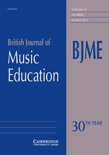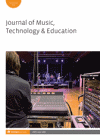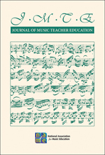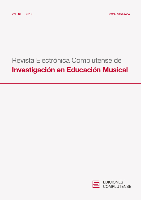
British Journal of Music Education
Scope & Guideline
Empowering Educators with Cutting-Edge Insights
Introduction
Aims and Scopes
- Music Teacher Education:
Focus on the training and professional development of music educators, addressing challenges, practices, and strategies for preparing teachers for the music education workforce. - Informal and Non-Traditional Music Learning:
Exploration of informal music learning methods, including community music projects and experiential learning, emphasizing their relevance in contemporary educational settings. - Impact of Technology in Music Education:
Investigation into the integration of digital tools and online platforms in music teaching, highlighting collaborative and innovative practices. - Student Engagement and Motivation:
Research on factors influencing student attitudes, motivation, and participation in music education, including barriers to engagement and strategies for improvement. - Cultural and Ethnomusicological Perspectives:
Incorporation of diverse musical traditions and cultural contexts in music education, fostering an understanding of global music practices. - Curriculum Development and Pedagogical Strategies:
Examination of curriculum design, teaching methodologies, and assessment practices in music education, focusing on effective approaches for different educational settings.
Trending and Emerging
- Impact of COVID-19 on Music Education:
The pandemic has catalyzed a significant body of research examining its effects on music teaching and learning, leading to discussions about resilience, adaptability, and future practices. - Collaborative and Remote Music Making:
Increasing interest in digitally mediated collaboration and remote participation, as educators explore new ways to engage students across distances. - Focus on Mental Health and Wellbeing:
Emerging studies highlight the psychological impact of music education and the role of musical training in promoting mental health and wellbeing among students. - Inclusive and Diverse Music Education Practices:
Growing emphasis on inclusivity in music education, addressing diverse student needs, backgrounds, and musical genres to create equitable learning environments. - Research on Music Teacher Identity:
Increased exploration of the identity formation of music teachers, particularly novice educators, and the factors shaping their professional experiences and practices.
Declining or Waning
- Traditional Music Instruction Methods:
There is a noticeable decrease in publications centered on conventional teaching methods, as the focus shifts towards more innovative and inclusive pedagogical approaches. - Research on Classical Music Exclusivity:
Studies specifically targeting classical music education have waned, indicating a broader acceptance and integration of diverse musical genres and practices. - Standardized Assessment Practices:
The emphasis on rigid, standardized assessment methods is diminishing, with an increasing preference for formative and reflective assessment approaches. - Teacher-Centric Pedagogies:
Research focusing solely on teacher-led instruction is declining, as the journal embraces more student-centered and collaborative learning models. - Barriers to Music Education:
While still relevant, discussions surrounding barriers to music education are less frequent, possibly due to the emerging focus on solutions and innovative practices.
Similar Journals

Opus
Exploring the Harmonies of Music ResearchOpus is an esteemed open-access journal published by the Associação Nacional de Pesquisa e Pós-Graduação em Música in Brazil, focusing on the field of music studies. With an ISSN of 1517-7017, Opus has been dedicated to fostering innovative research since its inception and has embraced the open-access model since 2009, ensuring that its findings are readily accessible to scholars and enthusiasts globally. The journal has achieved a commendable Q2 ranking in Music as of 2023, showcasing its impact and relevance within the arts and humanities. Although currently ranked #130 out of 180 in Scopus in the music category, Opus maintains a commitment to enhancing the scholarly discourse in musicology through empirical studies, theoretical analyses, and interdisciplinary approaches. The journal's convergence over the years, from 2017 to 2024, reflects its dedication to evolving educational and research methodologies in music. Situated in the vibrant academic landscape of Campinas, SP, Brazil, Opus invites researchers, professionals, and students to contribute to its mission of exploring the multifaceted dimensions of music.

Information and Communication Technology in Musical Field
Advancing Research at the Crossroads of Music and TechnologyInformation and Communication Technology in Musical Field is an esteemed academic journal published by MEDIA MUSICA, dedicated to exploring the intersections of technology and music. With an ISSN of 2067-9408 and an E-ISSN of 2069-654X, this journal serves as a vital resource for researchers, professionals, and students interested in the latest advancements and applications of information and communication technologies within the musical sphere. While specific impact factor metrics are currently unavailable, the journal aims to provide a platform for high-quality research that fosters innovation in music production, distribution, and theory. The implications of technology in music are profound, influencing everything from composition to performance and consumption, and this journal strives to illuminate these transformative changes. Located in Cluj-Napoca, Romania, at STR ICBRATIANU NR 25, this publication encourages submissions that contribute to the diverse dialogue surrounding music and technology, ensuring that it remains an essential reference for those at the forefront of this dynamic field.

FONTES ARTIS MUSICAE
Contributing to a rich legacy of music scholarship.FONTES ARTIS MUSICAE, with ISSN 0015-6191 and E-ISSN 2471-156X, is a distinguished journal published by A-R EDITIONS, specializing in the fields of Music and Library and Information Sciences. Established in the United States, this journal serves as a vital resource for scholars, practitioners, and students engaged in the exploration and analysis of music and its associated disciplines. With an established converged publication history from 2002 to 2024, FONTES ARTIS MUSICAE has consistently contributed to the discourse within its scope, reflected in its current quartile rankings of Q4 in Library and Information Sciences and Q3 in Music for 2023. Although not an open-access journal, it offers essential insights and research findings, appealing to a diverse academic audience. Its position within the 18th percentile of the Arts and Humanities (Music) category and 11th percentile in Library and Information Sciences underscores its growing significance in these fields, making it a critical platform for advancing knowledge and fostering collaboration.

MUSIK UND KIRCHE
Illuminating the Relationship Between Worship and MelodyMUSIK UND KIRCHE is a distinguished journal published by BARENREITER-VERLAG that offers a scholarly platform for the exploration of the intersections between music and ecclesiastical contexts. With an ISSN of 0027-4771 and an E-ISSN of 2568-3128, this journal is particularly valuable for researchers, practitioners, and students engaged in musicology, religious studies, and cultural history. Although currently not open access, it provides a wealth of peer-reviewed articles that enhance understanding of music's role within church tradition and practice, thereby contributing significantly to the field. Despite fluctuating visibility in academic rankings—standing in Q4 of the 2023 category for Music, based on Scopus evaluations—its historical coverage from 2002 to 2012 and resumed publication since 2020 demonstrates its commitment to fostering rigorous academic discourse. The journal is based in Kassel, Germany, and serves as an essential resource for anyone interested in the dynamic relationship between music and spiritual life.

MUSIC PERCEPTION
Exploring the Soundscape of Human ExperienceMUSIC PERCEPTION is a prestigious academic journal dedicated to the interdisciplinary exploration of musical experience and understanding. Published by the University of California Press, this journal has established itself as an essential resource in the field of music psychology, with a strong emphasis on how auditory stimuli influence human cognition and emotion. The journal boasts a commendable Q1 ranking in Music, placing it within the top-tier of scholarly publications, and it holds an impressive Scopus Rank of #4 out of 180 in the Arts and Humanities category, reflecting its critical role in advancing research within this domain. MUSIC PERCEPTION welcomes contributions that delve into diverse topics, including auditory perception, acoustics, and the psychological impacts of music, making it a vital platform for researchers, professionals, and students seeking to deepen their understanding of music's multifaceted nature. The journal is published annually and remains a cornerstone for academic discourse, ensuring that new findings are readily accessible to a global audience.

Journal of Music Technology & Education
Advancing the future of music education with technology.Welcome to the Journal of Music Technology & Education, a leading academic journal dedicated to the intersection of music, technology, and pedagogical practices. Published by INTELLECT LTD in the United Kingdom, this journal has gained considerable recognition within the scholarly community, particularly noted for its strong rankings across multiple disciplines. As of 2023, it holds a prestigious Q1 quartile position in Music, Q2 in Education, and Q3 in Computer Science Applications, highlighting its multifaceted impact on various fields. Spanning over a decade from 2012 to 2023, the journal features rigorous peer-reviewed articles that explore innovative approaches to music education, technology integration in teaching practices, and advancements in digital music creation. Researchers, educators, and students alike will find valuable insights and cutting-edge research to keep them at the forefront of this rapidly evolving landscape. Access to the journal's content is available to a broad audience, making it a vital resource for anyone interested in the vibrant world of music technology.

Journal of Music Teacher Education
Elevating Music Teaching Standards Worldwide.The Journal of Music Teacher Education, published by SAGE Publications Inc, is a leading scholarly outlet dedicated to advancing the field of music education. With an ISSN of 1057-0837 and an E-ISSN of 1945-0079, this journal explores a wide array of topics pertinent to music teaching and learning, serving as a vital resource for both researchers and practitioners in the music education community. Since its inception in 1991, it has consistently been positioned among the top-tier journals in both music and education, achieving a notable Q1 ranking in music and Q2 in education as of 2023. With impressive Scopus rankings, placing it in the 89th percentile for music and 47th percentile for education, the journal plays a crucial role in facilitating dialogue and disseminating innovative research aimed at improving music pedagogy. While not an open-access publication, it provides access to invaluable insights and practices that inform both theory and application in music education, making it an essential read for educators, students, and researchers alike, as they navigate the evolving landscape of music teaching. Explore the latest findings and thought-provoking discussions that shape the future of music education in the United States and beyond.

Revista Electronica Complutense de Investigacion en Educacion Musical-RECIEM
Transforming Music Education with Cutting-edge ResearchRevista Electronica Complutense de Investigacion en Educacion Musical (RECIEM) is a distinguished open-access journal published by UNIV COMPLUTENSE MADRID, SERVICIO PUBLICACIONES, dedicated to advancing research in the fields of music education and pedagogy. Since its inception in 2004, RECIEM has provided a vital platform for scholars, educators, and researchers to disseminate their findings and foster discussions that bridge the gap between theory and practice in music education. With an impressive ranking in the top quartile for music (Q1) and a respectable Q3 ranking in education for 2023, RECIEM is a pivotal resource for those engaged in the interdisciplinary nexus of arts and education. The journal's commitment to open access ensures that its scholarly content is available to a global audience, enhancing its impact and fostering collaboration among professionals in the music education community. The journal covers diverse topics within music and education, aiming to inspire innovation and reflect contemporary developments in teaching methodologies and musicological research. RECIEM’s continued growth—represented by its robust Scopus ranks and the convergence of years from 2004 to 2024—underscores its relevance and significance in shaping the future of music education research.

Studia Universitatis Babes-Bolyai Musica
Championing Open Access in Music ScholarshipStudia Universitatis Babes-Bolyai Musica is a prestigious academic journal dedicated to the field of musicology, published by UNIV BABES-BOLYAI. Since its inception, it has strived to foster scholarly communication and share groundbreaking research that spans various music-related disciplines, including ethnomusicology, music theory, and performance studies. The journal operates under an Open Access model since 2021, ensuring that its content is freely accessible to a global audience of researchers, professionals, and students interested in advancing their knowledge and understanding of music. By providing a platform for high-quality, peer-reviewed articles, Studia Universitatis Babes-Bolyai Musica plays a vital role in promoting significant contributions to the evolving discourse in music studies. Its commitment to intellectual rigor and openness aligns with contemporary academic trends, making it an essential resource in the realm of music research.

Oido Pensante
Connecting Scholars and Sound in Meaningful WaysOido Pensante is a prominent open-access journal dedicated to the multifaceted field of music, published by the esteemed University of Buenos Aires, specifically through its Faculty of Philosophy and Letters, Institute of Anthropological Sciences. Since its inception in 2013, this journal has fostered a rich platform for scholarly discourse and innovative research at the intersection of music and cultural studies. With an ISSN of 2250-7116, Oido Pensante aims to bridge theoretical frameworks and practical applications, making significant contributions to the understanding of music in its social context. Currently, it holds an impressive Q3 ranking in the Arts and Humanities – Music category for 2023, with a Scopus rank of #99 out of 180 journals, reflecting its commitment to academic rigor and relevance. The journal's open access policy ensures that research is widely disseminated and accessible, making it an invaluable resource for researchers, professionals, and students alike in Argentina and beyond. With converged years from 2017 to 2024, Oido Pensante continues to expand its reach, encouraging intellectual exchange and stimulating dialogue within the music community.